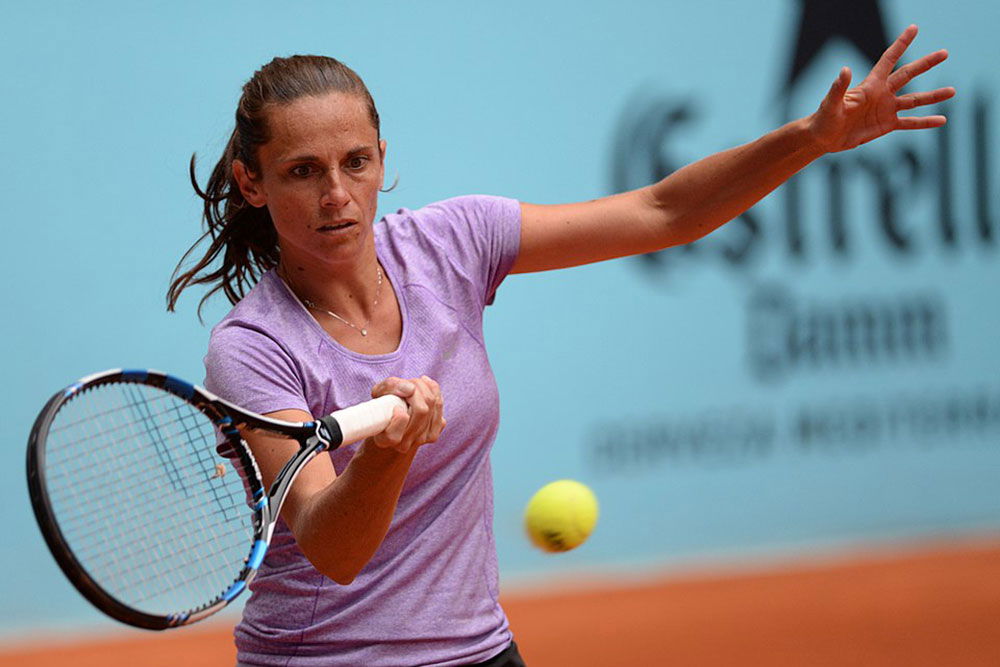
Roberta Vinci was born on February 18, 1983, and began playing tennis at a young age with a natural flair that would eventually distinguish her from her peers. She developed a style that relied on finesse rather than force, showing early signs of tactical intelligence and court sense.
In an era increasingly defined by power and baseline dominance, Vinci's choice to perfect a game based on variety and craft was both bold and refreshing. Her early years were spent competing in junior tournaments across Europe, where she learned to adapt and improvise.
Vinci turned professional in 1999 and spent the following years building her reputation. Unlike players who make instant waves, Vinci’s rise was gradual, marked by moments of progress and setbacks. Her ability to stay the course through these challenges would become a key trait.
She began to establish herself in both singles and doubles, steadily improving her ranking and gaining respect for her intelligence on court. Her one-handed backhand slice, rare in the modern women’s game, became a signature weapon that puzzled opponents.
Though Vinci would later find singles glory, her initial success came in doubles. Teaming up with childhood friend and compatriot Sara Errani, Vinci formed one of the most dominant duos in women’s tennis. Together, they won all four Grand Slam titles and achieved the World No. 1 doubles ranking.
The pair's chemistry and contrasting styles made them formidable. While Errani provided baseline consistency, Vinci added creativity and flair at the net. Their partnership highlighted the importance of synergy in doubles and redefined what Italian tennis could accomplish internationally.
Vinci’s singles career began to blossom in her thirties, a period when many players consider retirement. She broke into the top 20 and became known for her court craft, tactical play and fearless net approaches. Her game style was effective on every surface, especially grass and hard courts.
Her ability to disrupt rhythm and use angles creatively set her apart from more one-dimensional players. She was particularly strong against those who relied solely on power, as she could exploit pace and movement with clever shot variation.
Vinci made global headlines in 2015 when she shocked the tennis world by defeating Serena Williams in the US Open semifinal. Williams was on the brink of achieving the calendar-year Grand Slam, having already won the Australian Open, French Open and Wimbledon that year.
In one of the greatest upsets in tennis history, Vinci’s variety, composure and mental fortitude overwhelmed Williams. The 2–6, 6–4, 6–4 victory stunned fans and media, elevating Vinci’s profile overnight and proving that tactical intelligence could conquer raw power.
That victory over Serena led to an all-Italian final between Vinci and Flavia Pennetta, a historic moment for Italian tennis. Though Vinci lost the final, the event became one of the most iconic in the history of the US Open and a high point for Italian sport.
The final showcased Vinci’s grace and humility, as well as the depth of Italy’s tennis talent. Her performance throughout the tournament became a masterclass in strategy, resilience and emotional control under immense pressure.
Following her US Open performance, Vinci was widely celebrated for her contributions to tennis. She earned a career-high singles ranking of World No. 7 and received accolades for her role in revitalising interest in classical playing styles.
Her success proved that there was still room for variety in the modern game. Coaches and analysts pointed to Vinci as a reminder that tennis can be as much about creativity and intelligence as about speed and strength.
Vinci continued to compete with pride and professionalism until her retirement in 2018. She ended her career in Rome, in front of an adoring Italian crowd, receiving a standing ovation that reflected her impact on the sport and her popularity among fans.
Her final seasons were a celebration of everything she had accomplished, from team victories in Fed Cup to her individual triumphs on the biggest stages. She left the game on her own terms, with her head held high and her legacy secure.
Following retirement, Vinci stayed connected to tennis, participating in exhibition events, coaching clinics and television commentary. Her insight into match strategy and her engaging personality made her a natural in these roles.
She also became an inspiration for young Italian players, offering mentorship and sharing her story of persistence, reinvention and fearless play. Her transition from athlete to role model has been smooth and impactful.
Roberta Vinci's legacy is not only about titles and rankings but also about character. She brought authenticity to the court and remained true to her unique style despite pressure to conform to modern norms.
Her courage to be different and her success in doing so has made her a beloved figure in tennis. She continues to be remembered for her elegant slices, her surprise victory over Serena and her lasting influence on generations of players.
Roberta Vinci may not have dominated the sport statistically, but her impact goes far beyond numbers. She redefined what success could look like in modern tennis by relying on wit, strategy and unshakable belief in her own game.
Her journey from a crafty junior to a Grand Slam finalist is a testament to the idea that heart, intelligence and originality are still powerful tools in sport. Her story remains one of the most refreshing in tennis history.

More Details